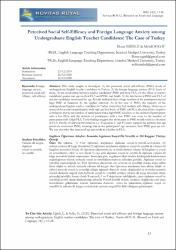Perceived social self-efficacy and foreign language anxiety among undergraduate english teacher candidates: The case of Turkey
Künye
Eğinli, İ. ve Solhi, M. (2020). Perceived social self-efficacy and foreign language anxiety among undergraduate english teacher candidates: The case of Turkey. Novitas-Royal, 14(1), 13-24.Özet
This study sought to investigate (1) the perceived social self-efficacy (PSSE) levels of undergraduate English teacher candidates in Turkey, (2) the foreign language anxiety (FLA) levels of them, (3) the relationship between teacher candidates’ PSSE and their FLA, (4) the effect of teacher candidates’ gender and age on their FLA and PSSE, and finally (5) the link between PSSE and FLA of teacher candidates moderated by age. Results indicated that a huge number of the participants lacked high PSSE as measured by the applied criterion. As in the case of PSSE, the majority of the undergraduate English teacher candidates in Turkey stated they had medium self-efficacy. However, in terms of the results on participants with high and low levels of PSSE and FLA, the data show a negative correlation; that is, the number of participants with a high PSSE was close to the number of participants with a low FLA, and the number of participants with a low PSSE was close to the number of participants with a high FLA. These findings suggest that an increase in PSSE would result in a decrease in FLA. Finally, all relevant information (i.e. R-squared, F, and P values) support the premise that age positively moderates PSSE, meaning that as the participants' age increases, their PSSE goes up too. We can also infer that increased age can result in a decline in FLA. Bu çalışma, (1) Türk öğretmen adaylarının algılanan sosyal öz yeterlik seviyelerini, (2) onların yabancı dil kaygı düzeylerini(3) öğretmen adaylarının algılanan sosyal öz yeterlik ile yabancı dil kaygıları arasındaki ilişkiyi, (4) öğretmen adaylarının yaş ve cinsiyetlerinin yabancı dil kaygıları ve sosyal öz yeterliklerine etkisi ve son olarak 5) yaşa göre algılanan sosyal öz yeterlik ile algılanan yabancı dil kaygı arasındaki ilişkiyi araştırmıştır. Sonuçlara göre, uygulanan ölçüt modele katıldığında katılımcıların çoğunluğunun yüksek seviyede sosyal öz yeterlilikten mahsun oldukları görüldü. Algılanan sosyal öz yeterlilik incelendiğinde ise, Türk öğretmen adaylarının orta seviyede öz yeterliliği olduğu tespit edildi, fakat düşük ve yüksek seviyede yabancı dil kaygısı olan öğretmen adaylarının tam aksine düşük ve yüksek seviyede sosyal öz yeterliliği olduğu saptandı. Buna ek olarak, değişkenler ve seviyeleri arasında önemli derecede negatif ilişki belirledi: sosyal öz yeterlilik arttıkça yabancı dil kaygı düzeyinin düşüş gösterdiği görüldü. Sonuç olarak R-squared, F ve P değerlerine bakıldığında, yaşın algılanan sosyal öz yeterliliği pozitif olarak ılımlandırdığı anlaşıldı. Pozitif ılımlılık demek, ortalayıcı değişkenin yani yaşın modelimizin gelişmesine katkıda bulunması demektir. Ayrıca bu çalışmamız, algılanan sosyal öz yeterlilik ile yabancı dil kaygısı seviyelerinin arasında negatif bir ilişki olduğunu göstermişti.


















